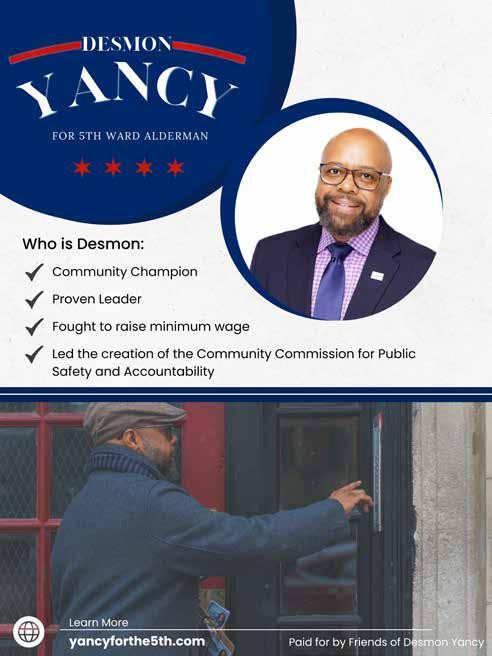
3 minute read
UNCF Uplifting 2023 Black History Month
This year’s theme, “Black Resistance,” acknowledges the role historically Black colleges and universities (HBCUs) have always played at the forefront of social justice movements in America
UNCF is continuing to make history by serving as the largest scholarship provider for students of color and supporting the excellence and high achievement of the nation’s historically Black colleges and universities (HBCUs) and their graduates.
Advertisement
This year’s month-long theme “Black Resistance”, designated by the Association for the Study of African American Life and History (ASALH), focuses on the contributions of African Americans and institutions, including HBCUs, to resist the status quo in leading economic, political and social change across the United States.
Formed prior to and after the Civil War, HBCUs were for many years the only opportunity for higher education open to African Americans. For more than 180 years, they have consistently graduated outstanding Americans of all races, who have made great contributions to the economic, political and social advancement of our nation.
“UNCF is proud to join our nation to uplift Black History Month, and we call for the continued support of HBCUs as the institutions that have played a pivotal role in leading the Black resistance movement in America and providing solutions to the societal ills of this nation,” said Maurice E. Jenkins, Jr., executive vice president, chief development officer, UNCF. “HBCUs have provided and continue providing a safe space for the formation of activists and leaders, artists, business own- ers and educators. They were at the forefront of the Civil Rights Movement, and Black Power and social justice movements. They stand as a testament to Black investment and creative thinking in the face of the changing landscape of higher education.”
UNCF co-founder Dr. Mary McLeod Bethune and Dr. Carter G. Woodson were the two individuals who shaped the course of American history and were instrumental in the creation of Negro History Week, now known as Black History Month. Bethune, the founder and first president of UNCF-member Bethune-Cookman University, was the first female president of Woodson’s Association for the Study of Negro Life and History, today known as the Association for the Study of African American Life and History (ASALH).
Bethune and Woodson understood how education, whether in elementary, secondary or higher education institutions were the pathways for Black people and communities to resist the narrative that Black people are intellectually inferior.
UNCF’s mission continues the lega cy and vision of Bethune and Woodson providing scholarships and other services to students who are from households with incomes less than $46,000, over 70% are Pell grant eligible, meaning they are from households with serious financial need, and nearly 40% are first generation college students. Yet at HBCUs, these students have an average access rate
Governor Pritzker Reminds Eligible Taxpayers to Take Advantage of Earned Income Tax Credit
CNW Staff Report more than twice that of all institutions nationwide and five times that of Ivy Plus institutions.
With thousands of Illinoisans failing to take advantage of savings offered by the federal Earned Income Tax Credit (EITC) and state Earned Income Credit (EIC) each tax season, Governor JB Pritzker is reminding qualifying taxpayers to claim these valuable benefits.
To be eligible for tax year 2022 (tax returns filed in 2023), taxpayers must have received “earned income” in 2022, meet certain income and residency qualifications, and file a tax return even if they do not owe any tax or are not required to file. The Internal Revenue Service (IRS) recommends that all workers who earned $59,187 or less last year, learn about EITC eligibility and use the EITC Assistant to see if they meet qualifications.
Taxpayers eligible for the federal EITC also automatically qualify for the Illinois EIC, which is a refundable tax credit worth up to 18 percent of their federal claim. Despite that, in 2022, more than 70,000 Illinoisans claimed a federal EITC credit without also claiming the state EIC, leaving over $25.3 million unclaimed.
For the 2022 tax year, the earned income credit ranges from $560 to $6,935, depending on the number of children claimed on the return. However, taxpayers do not have to have a child to claim the credit. Last year, 25 million eligible workers and families received $63 billion through the federal EITC. Taxpayers receiving earned income in the last three years that did not claim these benefits can still apply by filing amended returns.
To determine an Illinois EIC amount, taxpayers can follow the instructions for Schedule IL-E/EIC. For more information on determining a federal credit, taxpayers can visit the IRS website at www.irs.gov.
There are 101 accredited HBCUs currently operating in 19 states, the District of Columbia, and the U.S. Virgin Islands. While they constitute only 3% of higher education institutions in the country, HBCUs educate 10% of all Black college students. The HBCU student population is currently over 75% Black. These institutions account for 19% of degrees earned by Black students in STEM (science, technology, engineering, and math) fields (U.S. Department of Education, 2019). Additionally, HBCUs account for 80% of Black judges, 50% of Black doctors, and 50% of Black lawyers. UNCF and HBCUs make Black History every day, which is made possible through loyal donors and partners, who make financial contributions to continue this work. To learn how to donate to help students, who need support to attend and complete college, visit UNCF.org/donate.










